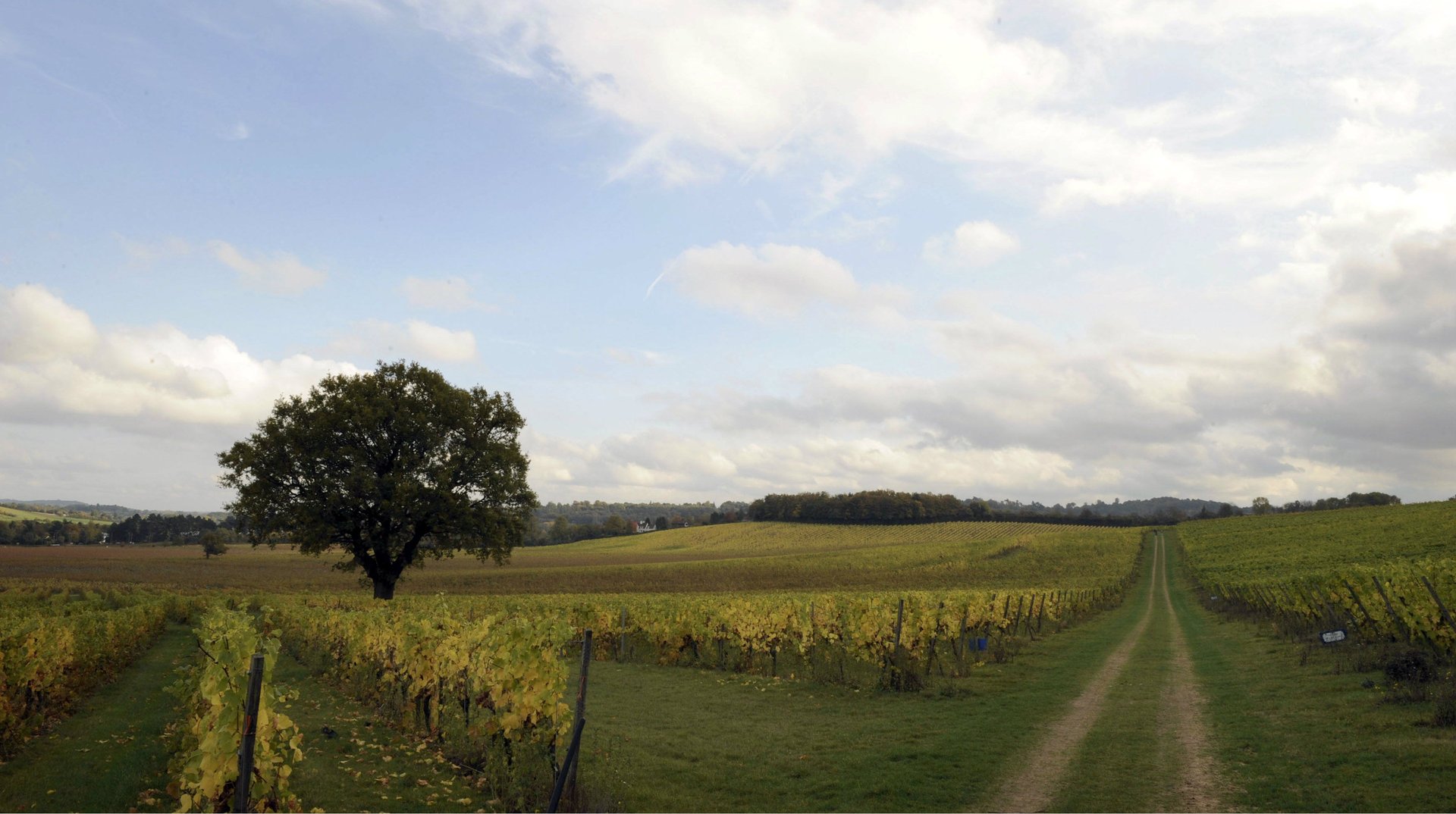After Brexit, Brits may want to drink more English wine
Brits have a reputation for liking a tipple. Last year, drinkers in the UK brought nearly £14 billion ($18.2 billion) worth of wine, or roughly 26 bottles per person, according to the IWSR. Almost all of it—99%—came from abroad, making the UK the largest per-capita importer of wine in the world.


Brits have a reputation for liking a tipple. Last year, drinkers in the UK brought nearly £14 billion ($18.2 billion) worth of wine, or roughly 26 bottles per person, according to the IWSR. Almost all of it—99%—came from abroad, making the UK the largest per-capita importer of wine in the world.
For those who like to kick back with a Côtes du Rhône, party with Prosecco, or chill with Champagne, there could be trouble looming. More than half of the wine Britain imports comes from the European Union, and Brexit threatens to squeeze the supply.
Already, the price of a typical bottle in UK wine shops has reached a record high. The average bottle of wine now sells for £5.56, a 3% increase from the end of 2016, thanks to the Brexit-induced plummet in the pound making imports more expensive, according to the UK’s Wine and Spirit Trade Association.
The UK Trade Policy Observatory recently ran some numbers to see how much worse Brexit might make it for the UK’s wine drinkers, who comprise 71% of the adult population (pdf). Short answer: much worse.
Kym Anderson of the University of Adelaide and Glyn Wittwer of Victoria University used their model of global wine markets (pdf) to estimate the effect Brexit will have by 2025. They modeled three scenarios: no Brexit, with 2.6% economic growth per year and pound’s level unchanged from 2014; a “large Brexit,” with 0.9% GDP growth and 20% fall in the pound; and a “small Brexit,” with 1.7% GDP growth and a 10% fall in the pound. Under both Brexit scenarios, it’s assumed no free-trade deal with the EU will be in place by 2025—although some Brexit boosters think a deal can be in place by the time the UK quits the bloc in 2019, the last trade deal agreed by the EU, with Canada, took around 10 years to negotiate.
According to Anderson and Wittwer, the most severe Brexit scenario would push consumer prices for wine up by a staggering 22% by 2025, and the volume consumed would drop by 28% as a result. Under their less severe scenario, prices would be 11% higher and consumption would fall by 17%. The pound has already lost 14% of its value against the euro since the Brexit vote in June last year, so it’s not that hard to imagine the shocks envisioned by these scenarios.
Trade is only part of the problem
According to Miles Beale, chief executive of the WSTA, the UK is already losing its reputation as a key player in the wine world, and Brexit will accelerate this decline. Anderson and Wittwer’s study is “helpfully terrifying,” he says.
The UK accounts for nearly 15% of the world’s wine imports. The drop in consumption assumed in the most severe Brexit scenario would have a ripple effect, depressing the value of the global wine trade by 3.5%.
When it comes to Brexit, the WSTA is “working very hard to achieve nothing,” Beale says. “We want no change in our ability to trade with the EU.”
The thing is, a free-trade agreement with the EU after the UK exits the bloc won’t necessarily make Brexit more manageable for the wine industry. The average tariff on non-EU wine imports is only around 13 pence per liter. Imposing a similar cost on EU wine imports after the UK leaves the EU wouldn’t help, but almost all of the post-Brexit price increase and expected decline in consumption would result of the pound’s decline and a general reduction in incomes (inflation-adjusted wages have already started to decline).
According to the researchers’ most severe Brexit scenario, the UK will import $1.75 billion, or 27%, less wine: $1.1 billion of this will be a result of lower incomes, $490 million from the depreciation of the pound, and just $140 million as a consequence of higher import tariffs.
And there there are duties. About half of the cost of a bottle of wine in the UK is down to domestic tax, imposed regardless of where a bottle comes from. The duty on still wine is £2.16 per bottle, before 20% value-added tax is added. The government imposed a 3.9% duty increase in April, and if Brexit puts the budget under pressure, it may feel the need to hike taxes further. In 2015, wine sales raised more than £9 billion for the treasury in various taxes.
Good news for English wine lovers
There is a silver lining in all this for UK winemakers. The industry is small but growing, with more than 500 vineyards and about 130 wineries in England and Wales, many of which specialize in sparkling wine.
Tamara Roberts, CEO of Ridgeview Estate Winery in the southeast of England, says UK supermarkets will only be able to absorb the higher costs of imported wine for so long. This will give locally produced wines an advantage, since retailers won’t be forced to hike prices because of the exchange rate or tariffs. As a result, British wines will seem relatively less expensive, encouraging people to switch over. So little of the wine Brits drink comes from the UK because small-scale production and a focus on sparkling wine make it a pricier alternative to imported bottles.

Last year, Brits bought 3.5 million bottles of English sparkling wine, an 8% increase in sales from the year before, although far behind the 85 million bottles of Prosecco sold the same year. Famous French champagne house Taittinger endorsed the wine-growing conditions in the UK by planting its first vines in Kent in May, with the first bottles expected by 2023.
While Brexit has the potential to boost home sales of English wine, it’s already benefiting exports. Roberts said Ridgeview’s export accounts were “buoyant” in the first half of 2017, and forecasters reckon UK wine exports will increase by 5% by 2025 under the most severe Brexit scenario.
Brexit ruins something else
Still, the UK wine industry is not necessarily celebrating Brexit. Many of the bottles, tanks, and workers that are crucial to the trade come from the EU, Roberts said. Higher costs or reduced availability of both machines and manpower could cancel out the beneficial aspects of Brexit for the local wine industry.
Ultimately, British wine drinkers will need to get used to paying more for their tipple of choice, since imported wine will always make up the bulk of what’s on offer in local shops. The only way wine drinkers will avoid this fate is if the UK government negotiates a transitional agreement with the EU (if not a fully fledged free trade deal), imposes few restrictions on the free movement of workers from the bloc, and the economy regains lost momentum, says Beale of the WSTA. In other words, something that resembles the conditions before the Brexit referendum.
Right now, the odds of a so-called “soft Brexit” don’t look good. “Our government has less authority and legitimacy to run negotiations for us,” says Beale. That’s bad news for the both the wine industry and wine drinkers. Time to switch to gin?